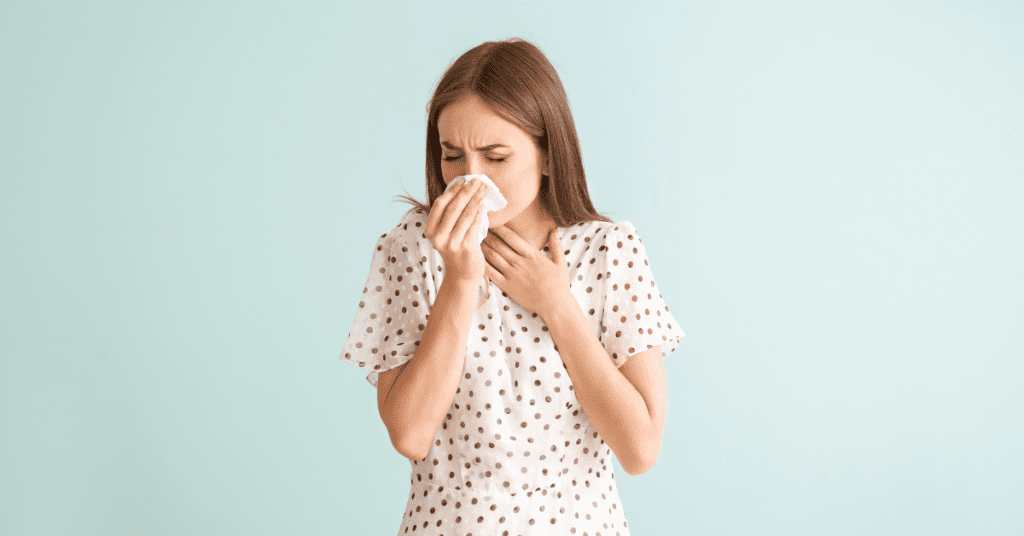Respiratory care refers to the healthcare specialty that focuses on the prevention, assessment, treatment, and management of patients with breathing or cardiopulmonary disorders. While Ayurveda has its unique approach to health and healing, it does recognize the importance of respiratory health. In Ayurveda, the respiratory system is associated with the “Prana Vayu,” which is considered one of the five primary life forces or vital energies (Vayus) in the body. The combination of Ayurveda and modern medicine in respiratory health offers a comprehensive approach to managing respiratory allergies and diseases. This clinical perspective of Ayurveda focuses on its application in managing conditions like bronchitis, the relationship between poor immunity and respiratory diseases, and the use of potent Ayurvedic immune boosters.

Respiratory Allergies Vs Bronchitis
Respiratory allergies and bronchitis are distinct respiratory conditions with distinct causes, symptoms, and treatments. Respiratory allergies are caused by the immune system reacting to airborne allergens, while bronchitis is the inflammation of bronchial tubes. Treatment typically involves avoiding allergens and using medications like antihistamines, decongestants, nasal corticosteroids, and allergy shots.
Bronchitis is the inflammation of bronchial tubes, which carry air to the lungs, caused by viral infections, smoke, or chemical fumes. Common symptoms include cough, chest discomfort, fatigue, shortness of breath, and fever. Treatment for acute bronchitis involves rest, hydration, and symptom-relief medications, while chronic bronchitis, especially if related to smoking, may require long-term management, including bronchodilators, inhaled corticosteroids, and lifestyle changes.
Modern medicine defines respiratory allergies as hypersensitive reactions to common environmental triggers, invoking an immune response. Ayurveda identifies imbalances in the Doshas as precursors to respiratory ailments. Ayurvedic treatment for bronchitis involves precise dosha evaluation, allowing for precise interventions that address the root cause.

Immune Boosters in Ayurveda
Ayurvedic herbs renowned for their immune-enhancing properties are gaining recognition for their role in fortifying the body’s defenses against respiratory pathogens. Within clinical contexts, the pursuit of potent immune boosters aligns with Ayurvedic Rasayana therapy. One well-established adaptogen, Ashwagandha, known for its immunomodulatory effects validated through randomized controlled trials, has shown promise in mitigating stress-induced immunosuppression. This contributes to enhancing the body’s resilience against respiratory infections.
Elevating Respiratory Care through Integrative Ayurveda
Respiratory care in Ayurveda focuses on balancing the doshas and promoting the overall well-being of the respiratory system. Ayurvedic treatments often involve herbal remedies personalized to an individual’s constitution, incorporating herbs with anti-inflammatory and bronchodilator properties. Panchakarma, a detoxification procedure in Ayurveda, plays a vital role in respiratory care. Therapies like Nasya (nasal administration of medicated oils), steam inhalation, and herbal decoctions aid in clearing respiratory passages, reducing congestion, and supporting the body’s natural detoxification processes. These approaches aim to not only alleviate symptoms but also address the root causes of respiratory issues for sustained well-being.
Enhancing respiratory care by integrating Ayurveda marks a significant shift in healthcare. Clinicians, equipped with Ayurvedic knowledge and evidence-based practices, can provide personalized and effective respiratory treatment. This blend of ancient wisdom and modern insights ushers in a new era of respiratory healthcare, emphasizing precision, clinical effectiveness, and overall well-being for improved patient outcomes.
At Apollo AyurVAID, our treatment involves a personalized, patient-centric approach, integrating Ayurvedic principles into a comprehensive medical management plan. This approach not only effectively provides symptomatic relief but also promotes sustained respiratory health.






